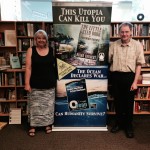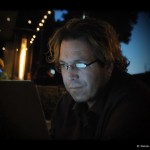A guest post by Bobbi Schemerhorn.
There are so many things that I would tell myself in the beginning. I walked into this career path with my eyes shut in many ways. I thought that my writing could do no wrong, that there were only minor skills to improve upon.
So in the beginning when I first started my Guardians Series I sent out several chapters to a friend to read. The woman whom I sent them out to was extremely critical of them. She was harsh with her critiques and I felt attacked in many ways. My arrogance was my undoing, her words hurt me, deeply.
My response to this was to quit, I walked away from it for many months, even years. I now doubted my story and my ability to tell it. But I wanted to write, I felt it in my bones, I knew in my heart that I was meant to write. I felt at peace in many ways when sitting behind a keyboard or with my pen in hand telling my stories.
So I returned to the book with open eyes, knowing that I was in no way infallible. I had so much to learn, I’m still learning every day. Although critiques can be harsh and painful at times to take, I do my best to see them for what they are. Not sharp daggers intending to kill my writing spirit but rather a gentle hand guiding it into a brighter light.
My advice would really come in two parts. The first one being, don’t give up on your dreams. There are always going to be obstacles in life. School, work, kids, spouses, etc., so you need to make time for it. There is nothing easy about being a writer, its hard work. So make sure that you want to be a writer as badly as you need to breathe.
My second piece of advice is, see the criticisms for what they are. Take the notes that are most helpful, the ones that are aimed to help you improve and disregard the rest. There will always be people out there that will want to see you fail. But the people that matter in life want you to have nothing but success.
I know that the strongest piece of advice that is given all the time is, grow a thick skin. That is sound advice, but I don’t think that it is always appropriate.
To say grow a thicker skin may not be the words that I would use. Because I feel that it doesn’t always fit the situation. An old African proverb said: When there is no enemy within, the enemies outside cannot hurt you.
This work isn’t easy, it’s challenging, frustrating, and sometimes even heartbreaking. But it is worth every word, sentence, paragraph, and second.
 Guest Writer Bio: Bobbi Schemerhorn has always come up with wild stories and characters since a young age. Many played out in school yards role playing but never written down. Till she entered seventh grade her teacher had handed everyone journals to document their weeks events and activities. Instead of speaking about her weekend, she created worlds and people within them. As the years passed the writing ceased and did not return again till her early thirties. When the characters and world for the Guardians Series came to life for her. It took many years of encouragement from her husband before she gathered the courage to follow a dream that had always been in her heart. Now she spends her time doing what her soul always knew she should be doing.
Guest Writer Bio: Bobbi Schemerhorn has always come up with wild stories and characters since a young age. Many played out in school yards role playing but never written down. Till she entered seventh grade her teacher had handed everyone journals to document their weeks events and activities. Instead of speaking about her weekend, she created worlds and people within them. As the years passed the writing ceased and did not return again till her early thirties. When the characters and world for the Guardians Series came to life for her. It took many years of encouragement from her husband before she gathered the courage to follow a dream that had always been in her heart. Now she spends her time doing what her soul always knew she should be doing.



